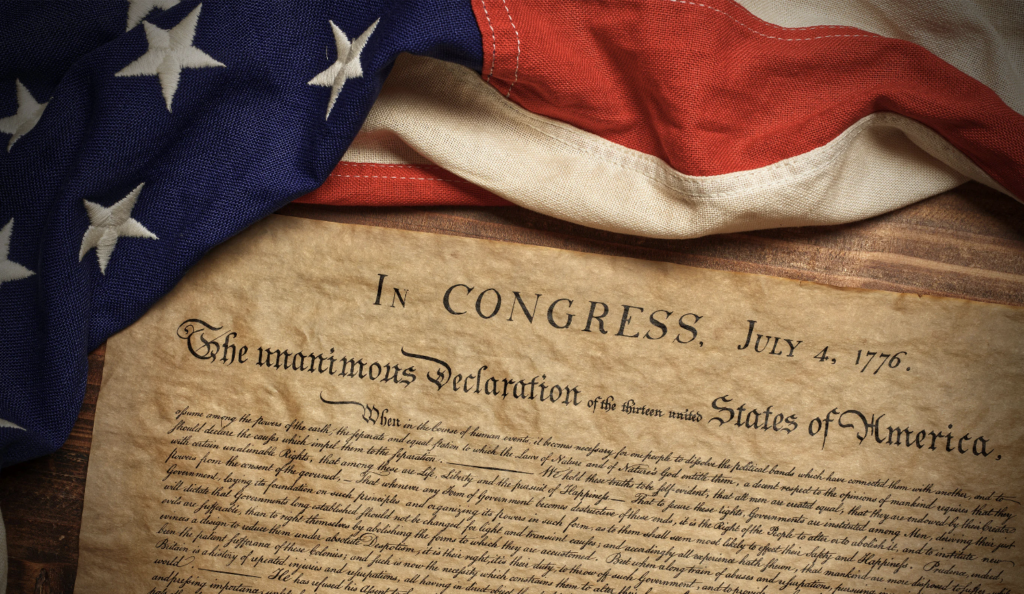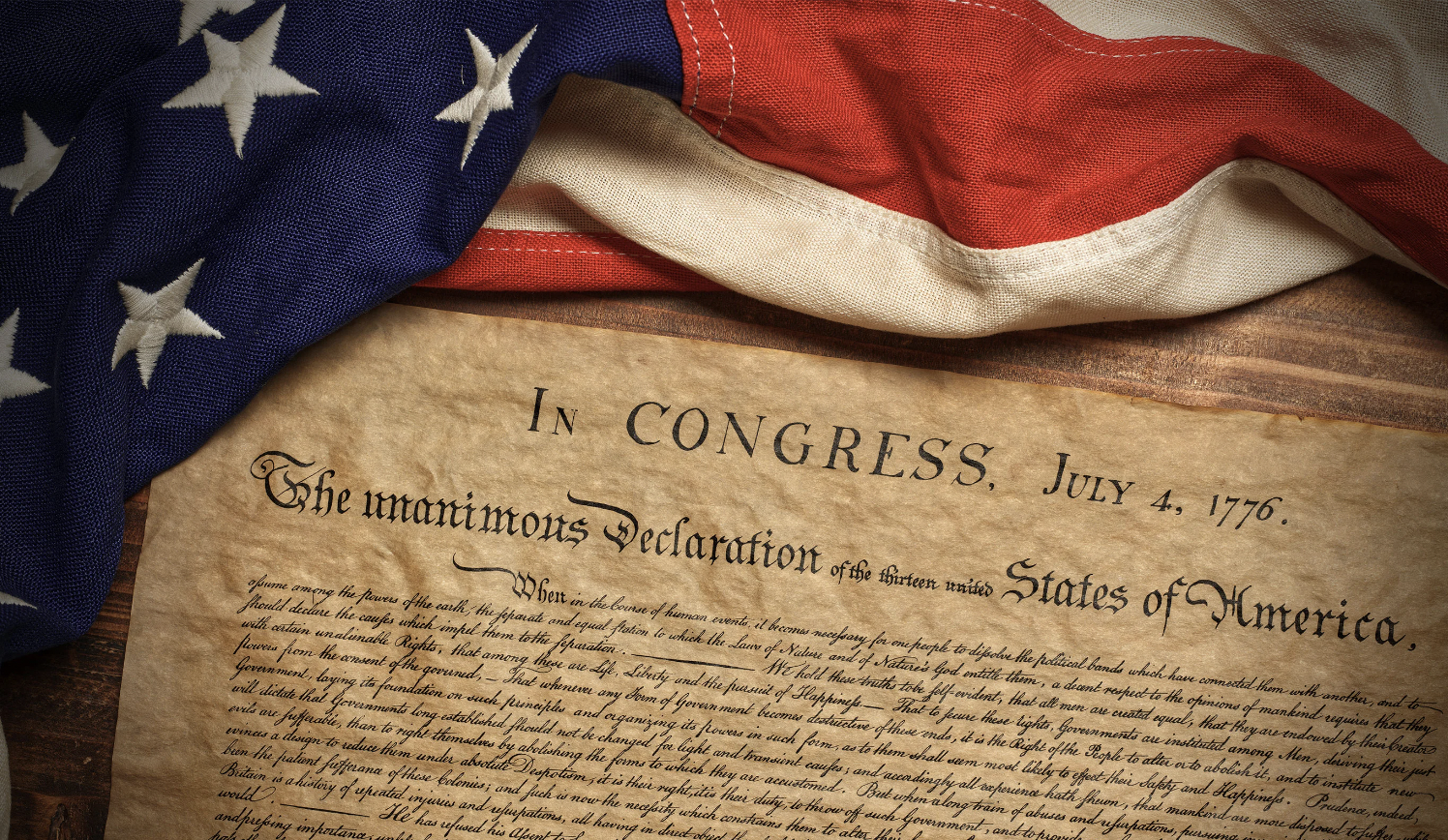Declaration Of Independence
In Congress, July 4, 1776. The unanimous Declaration of the thirteen united States of America,
“We hold these truths to be self-evident, that all men are created equal, that they are endowed by their Creator with certain unalienable Rights, that among these are Life, Liberty and the pursuit of Happiness.”
The United States Declaration of Independence

Principles of Christian Liberty
The Council of Jerusalem, described in Acts 15, sought to answer practical questions faced by the early Christians as they wrestled with how to enjoy freedom from the Laws of Moses without becoming stumbling blocks to Jewish people.
These were questions to which Paul in particular gave a great deal of thought. He was, after all, one of those appointed by the Jerusalem Council to circulate and explain the letter that summarized the decisions of the apostles and elders. Faced with similar issues in the church at Rome, he provided them with a series of principles that apply equally well to twenty-first-century Christians. His teaching in Romans 1:14-15 contains healthy (and very necessary) guidelines for the exercise of Christian liberty. Here are four of them:
- PRINCIPLE 1. Christian liberty must never be flaunted. “Whatever you believe about these things keep between yourself and God” (Romans 14:22 NIV). We are free in Christ from the Mosaic dietary laws; Christ has pronounced all food clean (Mark 7:18-19). But you do not need to exercise your liberty in order to enjoy it. Indeed, Paul elsewhere asks some very penetrating questions of those who insist on exercising their liberty whatever the circumstances: Does this really build up others? Is this really liberating you—or has it actually begun to enslave you (Romans 14:19; 1 Corinthians 6:12)? The subtle truth is that the Christian who has to exercise his or her liberty is in bondage to the very thing he or she insists on doing. Says Paul, if the kingdom consists for you in food, drink, and the like, you have missed the point of the gospel and the freedom of the Spirit (Romans 14:17).
- PRINCIPLE 2. Christian liberty does not mean that you welcome fellow Christians only when you have sorted out their views on their ways and beliefs. God has welcomed them in Christ, as they are; so should we (Romans 14:1,3). True, the Lord will not leave them as they are. But He does not make their pattern of conduct the basis of His welcome. Neither should we. We have many responsibilities for our fellow Christians, but being their judge is not one of them. Christ alone is that. How sad it is to hear (as we do far too often) the name of another Christian mentioned in conversation, only for someone to pounce immediately on him or her in criticism. That is not so much a mark of discernment as it is the evidence of a judgmental spirit. What if the measure we use to judge others becomes the measure used to judge us (Romans 14:10-12; Matthew 7:2)?
- PRINCIPLE 3: Christian liberty ought never to be used in such a way that you become a stumbling block to another Christian (Romans 14:13). When Paul states this principle, it is not a spur-of-the-moment reaction, but a settled principle he has thought out and to which he has very deliberately committed himself (see 1 Corinthians 8:13). When that commitment is made, it eventually becomes so much a part of our thinking that it directs our behavior instinctively. We are given liberty in Christ in order to be the servants of others, not in order to indulge our own preferences.
- PRINCIPLE 4: Christian liberty requires grasping the principle that will produce this true biblical balance: “We … ought … not to please ourselves…. For even Christ did not please himself” (Romans 15:1-3). There is something devastatingly simple about this. It reduces the issue to the basic questions of love for the Lord Jesus Christ and a desire to imitate Him since His Spirit indwells us to make us more like Him.
Privileges, Not Rights
True Christian liberty, unlike the various “freedom” or “liberation” movements of the secular world, is not a matter of demanding the “rights” we have. Dare one say that the American Founding Fathers, for all their wisdom, may have inadvertently triggered off a distortion of Christianity by speaking about our “rights” to life, liberty, and the pursuit of happiness? The Christian realizes that before God he or she possesses no “rights” by nature. In our sinfulness, we have forfeited all of our “rights.”
Only when we recognize that we do not deserve our “rights” can we properly exercise them as privileges. Sensitivity to others in the church, especially weaker others, depends on this sense of our own unworthiness. If we assume that we have liberties to be exercised at all costs, we become potentially lethal weapons in a fellowship, all too capable of destroying someone for whom Christ has died (Romans 14:15, 20).
That does not mean that I must become the slave of another’s conscience. We restrain the exercise of our freedom for the sake of weak believers, but not when we are faced with Pharisees who demand that we conform to what is unscriptural. Where the gospel is at stake, liberty needs to be exercised; where the stability of a weak Christian is at stake, we need to restrain it.
[This posting is an excerpt from a 2007 article by Sinclair Ferguson published in In Christ Alone: Living the Gospel-Centered Life.]
———-
Soul health and spiritual maturity cannot be separated. Our counselors are ordained Christian ministers as well as certified and licensed Christian counselors. We are able to help you experience freedom from shame, anxiety, depression, or marriage / relationship conflict with methods that are purely Christ-centered. Please click on this link to learn much more about how our CHRISTIAN COUNSELING in Louisville, Kentucky can help you become a more authentic follower of Christ, and help you find freedom from identity dependence.https://lifetrainingcounseling.org/
Life Training offers convenient sessions at https://lifetrainingcounseling.org/depression-counseling/our office in Louisville, Kentucky, as well as online counseling via Zoom or FaceTime. Our non-profit counseling practice has had an outstanding track record from over a decade helping men and women, individuals and couples who are ready to move beyond anxiety, depression, and conflicts in marriage or other relationships find hope and healing in their lives. Contact us today at 502-717-5433, or by email at drdave@lifetrainingcounseling.org

